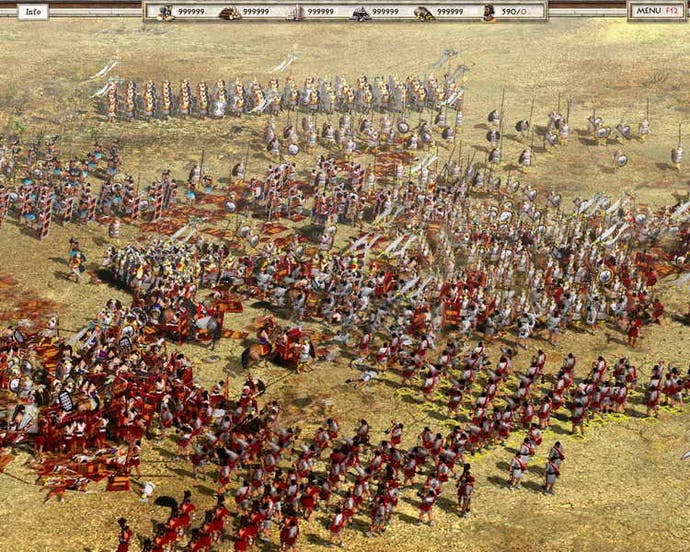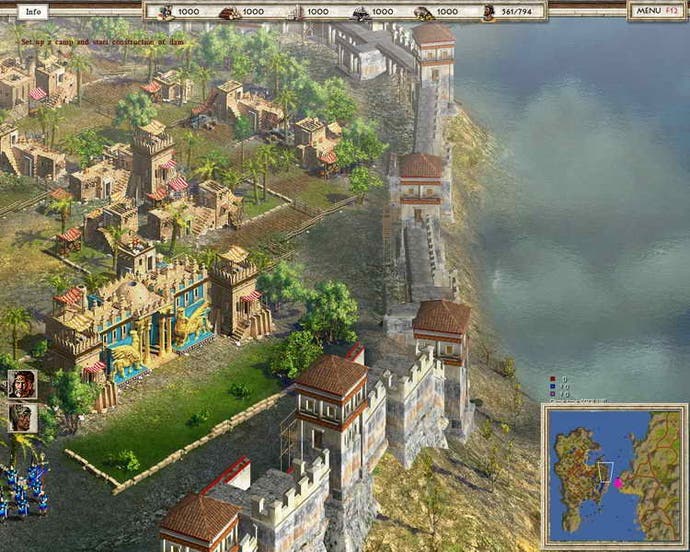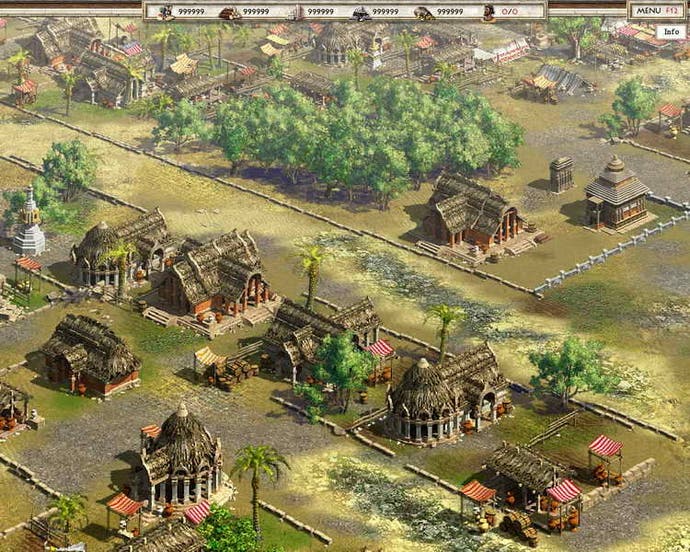Alexander
Much like The Hitman and Her for the pre-Romans.

Please remember: as you read this, Cybertron is under threat.
The planet-destroying Chaos God, Unicron, is approaching the Transformer's home-planet. While already ploughed a path through the civilised Galaxy, it seems he plans to consume its two moons before moving on to devour the errant silver globe that Cybertronians call home. And even worse, due to a surprise strike by the Decepticons, the Autobots are going to have to try and stop him without the leadership of Optimus Prime. Since that kinda puts Ultra Magnus in charge, things are looking pretty dire. What are they going to do?
While "We're living in the future!" has become - well, at least in my terribly cool circles - a catchphrase to be cheerily chirped whenever the slightest technical jiggery-pokery rears its head, from text messaging upwards, as the 2005 inches onto the Calendar a horrific truth becomes apparent... this is the year which Transformers: The Movie is set.
We are living in the Future. And thinking of the sub-par RTS I've been playing, I can't help but feel disappointed. Optimus Prime died for this?
Compared to most genres - the fact something as flawed as Vampire was still the stand-out PC RPG of the year is just scary - the RTS had a sterling year. Alexander arrived towards 2004's close, after the orgasms of Rome, Dawn of War et al, acting as the inevitable wet patch sinking into gaming's sodden mattress.
It's not terrible. Okay, I'm lying: in certain areas it is pretty terrible, but bits of it operate in an entirely acceptable manner. It's a licensed RTS based around the typically overblown Oliver Stone movie about the eponymous top bisexual world-conqueror. Ukraine's finest, GSC, has a history with the historical wargame which crosses over to those with relatively modest specification PCs (i.e. it developed Cossacks. And American Conquest.), so aren't a bad fit for creating a game aimed at a relative mass audience with a suitable intelligent edge. It's based on the technology for the forthcoming Cossacks 2, which while keeping the 2D sprites - so allowing the apparent 64,000 or so troops it claims it can have on a level - introduces attractive 3D backgrounds, so isn't technically remedial. The FMV footage is the real film footage, so looks fairly pretty in those bits too (Though not nearly enough Angelina Jolie for this reviewer's tastes). There's all the standard RTS options, plus a bit more, such as four fairly lengthy campaigns, skirmish games, online play and pre-designed missions.
If you squint, and were very forgiving, you could just accept it as a genre-standard RTS.
Don't. Eyes wide open.

Firstly, the campaigns, which feature some absolutely horrific game design. There's four of them, but with the lack of inspiration on show and the actual tedium required in completing the missions, I'd be surprised if you managed to complete the first (Alexander's Macedonian Boyz Road Trip) let alone reach the Persians, Indians and Greeks. Favouring the sprawling GSC-standard maps, on the non-battle missions you find yourself trawling a handful of units from one side of the map to another and - as often as not - back again. The only threat was the chance you'll have missed some minor rule that wasn't properly explained due to the game's startling lack of in-game documentation and training sequences or alt-tabbing back to desktop to get on with some serious porn-browsing. It makes an attempt at the Warcraft III-style character-adventure aspects - with heroes gaining XP along the way - but completely fumbles through its sheer basic repetition and slow slog.
The story-lead aspects also suffers from seemingly having been voiced by the first English-speakers who the developers could find outside its Kiev headquarters, and a script which appears to have been created in the manner of some Burroughsian style cut-up, with bits of scripts for Xena thrown in the air after the jokes have been removed, and the voice-actors saying whatever resulted. Philip insisting to his son before battle that the "Attack should be violent". Er... yes, Dad. Inadvertent comedy also abounds, with Mercenary commanders being lured to join the assault on Persia because "The booty is immense there, no doubt". He likes big butts and he cannot lie. It doesn't even do a good job of presenting Alexander's legend - for example, the Gordian knot mission just followed your attempts to get across town to the knot... and then the level completes, without even mentioning his piece of famous lateral thinking.
The battle scenes in the campaign are equally flawed, if less tedious. While the skirmish, with its standard gather-materials/create troops RTS template, has tactical questions for you to ask yourself, major battles offer nothing. Well... at least after you've decided to play to the game's weaknesses.
For example, this is how I defeated Darius of Persia on our first encounter. He outnumbers me hugely, but I have better troops. A Gordian Knot which I cut by having my entire right and centre march to pile up on the left flank, group as a single selection and then march en masse towards the uppity-foreigners. The enemy's scripting is as such that if troops don't enter their own detect zone, they'll sit there whistling and idly wondering what all those screams in the distance are about. With a huge local advantage, I could simply walk up the line rolling it up.
Group-select all your units. Click on the enemy lines. Is it just me, or do you think that's falling a little short of any real definition of Real-Time strategy?

It couldn't happen in Rome - the only other major RTS that throws around comparable amounts of troops - because it doesn't allow units to overlap significantly, while Alexander often seems to be trying to answer the theological conundrum of how many assorted Ancient warriors can dance on the head of a pin by how closely you can pack soldiers. I wasn't really convinced even in Cossacks what the thousands of troops on screen actually added to the game, and I'm less convinced here. When the numbers get too high, it's just like trying to solve a million-piece jigsaw from orbit, with fine-control absent. A selection of bugs don't really help either - I'm particularly bemused by my heroes who, when they get separated from a fight, occasionally just freeze mid-attack rather than following the battle requiring a swift-re-order to wake them up again.
In fact, speaking generally, in a world where Rome exists, why should this? But... well, someone said after the review of Rome that comparing it to - say - most other RTSs was unfair or something. Which kind of threw me. Sure it's unfair, because Rome is a gargantuan monolith of ambition and most RTS games aren't even trying. But what they meant was that since it was just a standard-model RTS, to compare it against something that pushed the edges a little wasn't what we meant to do. In other words, unoriginality and prefabricated design has reached the point where no-one actually expects anything in a genre except what the genre's done before.
This is rubbish.
You really have no need to own this. Perhaps this is a mark less than a strictly fair analysis would have it. If you forget about the campaigns - and God knows, you're going to try and forget about the campaigns - the skirmish is an entirely competent example of its genre, and its inclusion enough to make this not actually an actively worthless game per se.
But fair marking can go to hell.
If you have any decent RTS from - oooh - Age of Empires onwards, you'll have a comparable Skirmish mode to this, with only GSC's perennial more is MORE approach to distinguish it. Since the more is MORE approach is, as argued above, misguided at best, this is literally something you'll probably have dozens of resting on the dusty shelves of your Game Library.
Go get them out again, and continue your vigil, waiting for the future we were promised, not just what they think they can sell us. Again.

